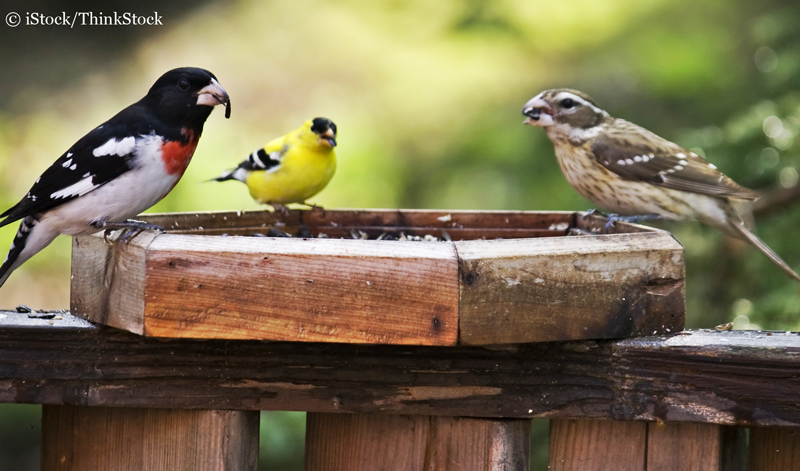
With the cooler weather coming soon its important to feed your wild bird friends the appropriate seed.
Excerpted from "The Need for Seed,” by Sharon Stiteler, Backyard Birding, Volume 1, published by I-5 Publishing.
Just like with pet bird seed, make sure you feed your wild birds the most appropriate wild bird seed for their dietary needs. Feed your wild birds those seeds and not the "filler” food found in some wild bird seed mixes. You will have to spend more money on quality wild bird seeds, but it will be worth it.
Uneaten bird seeds accumulate and may foster mold or created unsanitary conditions at your bird feeder. It may attract unwanted visitors, such as rodents.
Test new wild bird seed mixes in your bird feeder in small amounts to see what gets eaten and what gets left. Bird seed packages list contents, so you should be able to identify what’s working and what isn’t for the birds in your area.
Top Wild Bird Seeds 1) Black-oil sunflower seed: If you use only one bird seed, make it black-oil sunflower seed. It is quite possibly the most crucial seed you can offer backyard wild birds. No matter where you live, this high-fat, high meat-to-shell ratio seed attracts more bird species of seedeaters than any other. Wild birds that prefer black-oil sunflower seed include Northern Cardinals, jays, finches, grosbeaks, chickadees, titmice, nuthatches and woodpeckers.
2) Sunflower hearts: The only bird seed that rivals black-oil sunflower seed in popularity. This bird seed goes by many different names, including hearts, sunflower pieces, sunflower chips and hulled/shelled sunflowers. The chips come in different sizes, including the whole heart, medium-sized and extra-fine (which fits through the tiny holes of a finch feeder). Since the seed is out of the shell, it will not germinate, which makes it ideal for people who want to avoid a shell mess. Wild birds that prefer sunflower hearts include finches, chickadees, Northern cardinals, nuthatches, buntings and grosbeaks.
3) Safflower: Some but not all wild birds eat this bird seed. The big advantage to safflower seed is that grackles – a native blackbird -- do not care for the taste and starlings are unable to crack it open. The problem with grackles is that they arrive in large flocks and quickly empty a bird feeder. Offer safflower seeds to wild birds slowly because a sudden shift from sunflower seeds to safflower seeds at the wild bird feeder may cause the birds to abandon the feeder for a few weeks. Wild birds that eat safflower include Northern cardinals, rose-breasted grosbeaks, house finches, nuthatches, mourning doves and chickadees.
4) White millet: Best used in moderation, handfuls of white millet seed scattered on the ground or on a bird feeder is a fun addition to any yard, especially during migration when sparrows are on the move. Wild birds that eat white millet seed include white-throated sparrows, white-crowned sparrows, fox sparrows, dark-eyed juncos, indigo buntings and painted buntings.
5) Dried corn: Best offered in moderation in either cracked or whole kernel form. Beware that corn also attracts deer, raccoons, foxes, squirrels and Canada geese. Wild birds that enjoy cracked corn include red-winged blackbirds, yellow-headed blackbirds, brown-headed cowbirds, blue jays, juncos and native sparrows. Wild birds that enjoy whole kernel corn include wild turkeys, ring-necked pheasants, quail, blue jays and waterfowl.
6) Nuts: You can offer peanuts or mixed nuts with cashews, almonds, pecans, walnuts and pistachios to wild birds. Unsalted nuts are the best for wild birds. Like sunflower hearts, peanuts can get moldy in rain or humid weather. Wild birds that eat nuts include woodpeckers, chickadees, nuthatches, jays and Northern cardinals.
7) Nyjer thistle: Also called niger (pronounced NYE-jer), as it was imported from Nigeria. Because the name niger was occasionally mispronounced, bird seed sellers started calling it by the folkname "thistle.” However this caused people to get it confused with the noxious thistle weed. The Wild Bird Feeding Industry came up with the idea of spelling the name phonetically: Nyjer. Many now call it nyjer or nyjer thistle. You can buy nyjer by itself or you can get it mixed with extra-fine sunflower chips. Purchase nyjer in small quantities and purchase it often as goes bad after six months or when wet. Wild birds that eat nyjer include American goldfinches, house finches, lesser goldfinches, purple finches, pine siskins, common redpolls, indigo buntings and painted buntings.